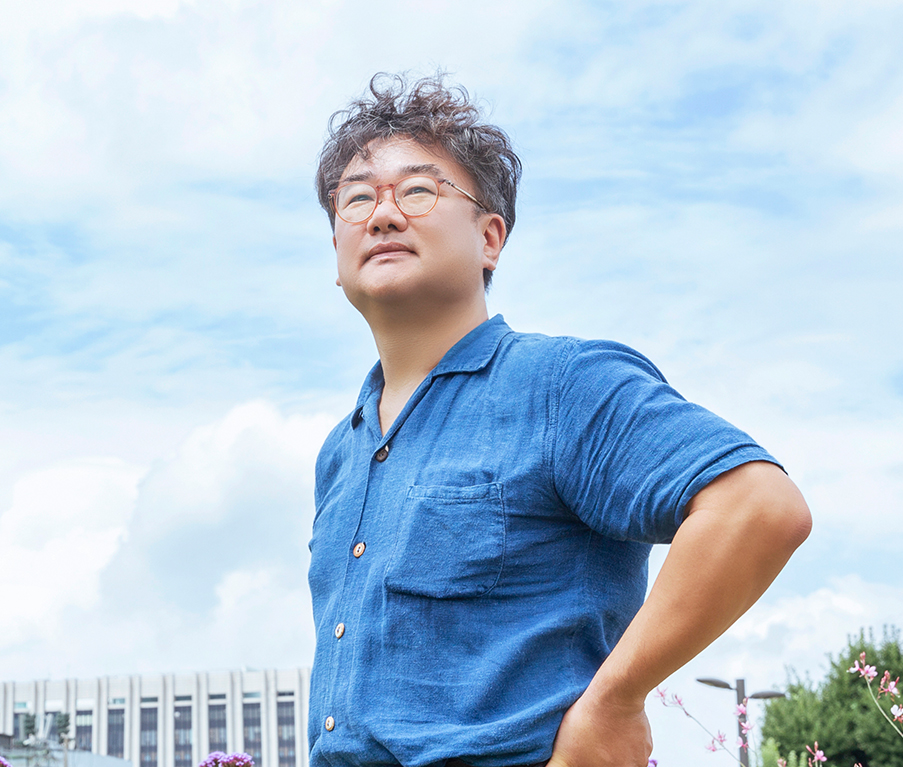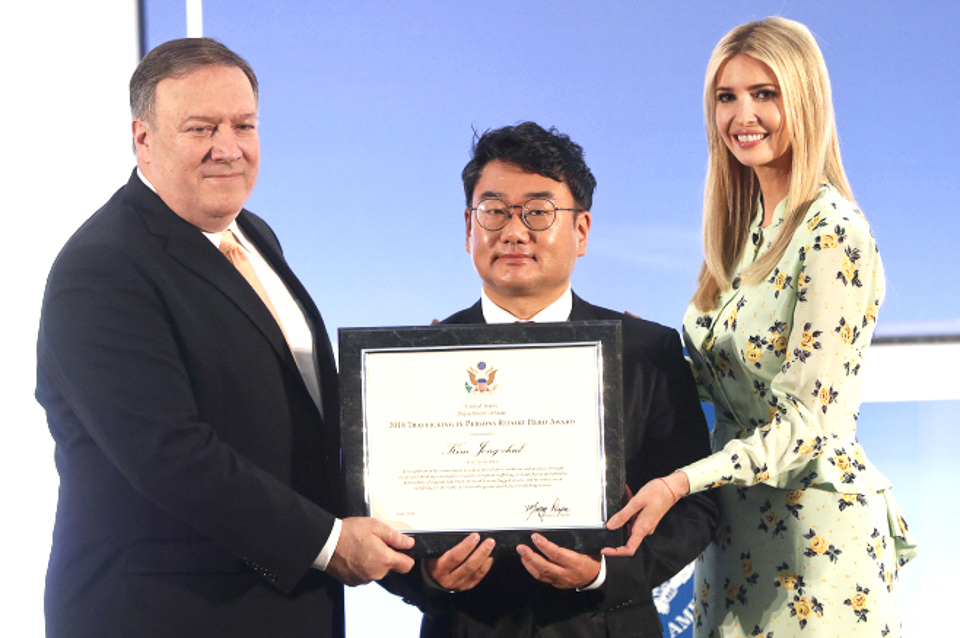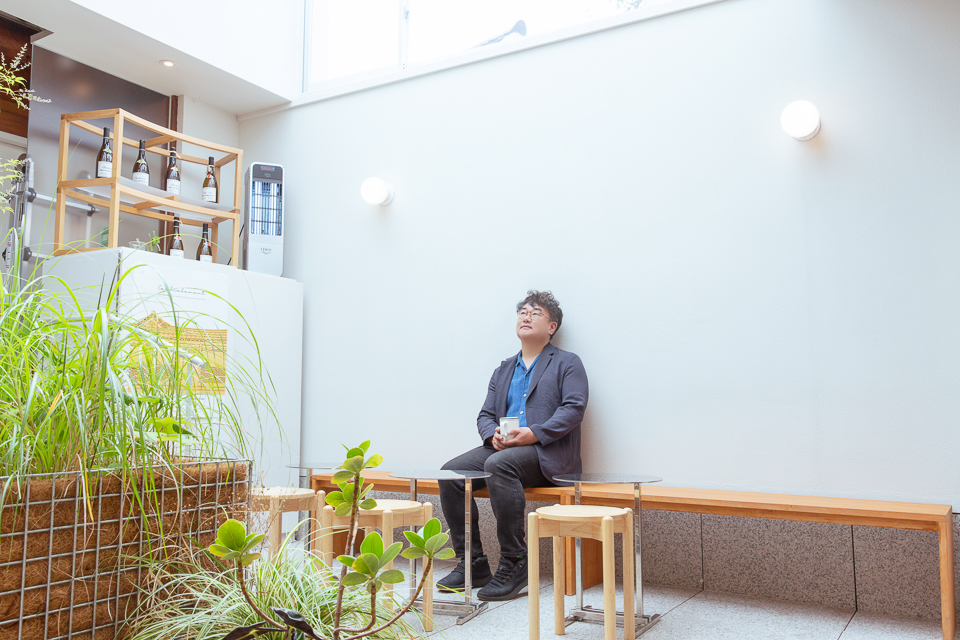- writing date 2024.10.02
- author Communication Team
- hits 93
A Refugee Lawyer Turned Farmer
Jongchul Kim
(College of Law, ‘90)
grows from the seeds of hospitality

A man who bears fruit slowly. This is how Jongchul Kim introduced himself. He has dedicated himself to protecting the human rights of the socially disadvantaged, choosing to journey with those in need rather than aiming for the top. With a unique career path that started as a lawyer and now includes farming, the stories Kim shared were as colorful as the diverse crops he carefully cultivates.
A Law Student's Romantic Campus Life
University life wasn't easy for Kim. He wasn't interested in his major, law, or in college society activities. "I was just an ordinary student who didn’t stand out. I didn't participate in the democratization movement that many students were passionate about at the time, nor was I particularly enthusiastic about my studies. I thought I'd pick up the violin again, which I had learned in elementary school, so I joined an orchestra, but it was a place where only highly sophisticated students were present, so I didn't fit in well," he laughed.
Despite this, he is full of memories of his college life thanks to his exploration of every corner of the campus with his girlfriend. It was a time when they were busy being in love. "I think we were most passionate about our relationship. She was a high school junior who grew up in the same neighborhood as me, and I gave her a tour of the campus. As it happened, she entered Korea University, and we became a campus couple. I remember each of us sipping a cup of coffee from the vending machine in front of the classical music listening room and pretending to listen to music. We dated for 8 years and got married."
Fighting for the Happy Endings of Wanderers
After a long period of studying for the bar exam, he passed it in 2002, but he didn't immediately go to the Judicial Research and Training Institute. He spent two years at the Christian community L'Abri in Yangyang, Gangwon Province, serving food to visitors and engaging in debates over various issues. This delayed start to his career properly became an opportunity to throw himself into new experiments in life. Among them, the decision that had the biggest impact on Kim's life was to practice law for the public good. The moment he listened to the stories of those who came to a foreign land fleeing various forms of political and cultural persecution, his unique career began.
"At my first job at the law firm Somyung, I did pro bono work to support refugees because I was fascinated by the various stories of refugees I had heard during my time at the Judicial Research and Training Institute. Unlike me, who lived an ordinary and uneventful life, their lives were full of courageous choices. At some point, I thought it would be nice if these people's lives had a happy ending and that I could be of help.”
The non-profit organization Advocates for Public Interest Law (APIL), which he founded in 2011, is dedicated to protecting the rights of those who are stuck in legal limbo, such as refugees, victims of human trafficking and detained immigrants, through litigation support and policy research. Building a legal community based on donations is a challenge, but overcoming the racial discrimination that permeates our society is another. "In the early days, I wondered if a lawyer could live on donations and contributions from others in our society. But many people empathize and make contributions to APIL, so it wasn't as difficult as I thought. But more than the financial aspects, it's sometimes difficult to work in a social atmosphere that is harsh to immigrants compared to other developed countries."
There haven’t been as many legal wins as one might think, less than half of cases. When asked if it's difficult when the effort put in doesn't always yield results, Kim says there's something that is as important as outcomes. "I think the act of identifying things you can do even in desperate situations, and trying to do them, is meaningful in itself. Fighting on someone else's side is a rewarding experience, regardless of victory or defeat."

Kim received the Trafficking in Persons (TIP) Report Heroes Award from the U.S. State Department in 2018
In the succeeding years he gained impressive recognition of his pioneering efforts. APIL received the Public Interest Lawyer Award from the Korean Bar Association in 2016, and Kim received the Trafficking in Persons (TIP) Report Heroes Award from the U.S. Department of State in 2018. "I felt a bit flattered because there were people who had been working on human trafficking for much longer,” he said humbly. “I received the award in the U.S., and it was amazing to have Secretary of State Pompeo and former President Trump's daughter Ivanka as the award presenters."

"I think the act of identifying things you can do even in desperate situations, and trying to do them, is meaningful in itself. Fighting on someone else's side is a rewarding experience, regardless of victory or defeat."
The Life and Dreams of a Lawyer and Novice Farmer
A few years ago, Kim entered a completely different field. After he stepped down as the lead lawyer of APIL in 2019 he began farming in Yangyang upon his graduation from a school of agriculture in the U.S.. "I was advised to do something completely different outside of Korea during my sabbatical, so I went to the U.S. That's when I started thinking seriously about farming."
Farming is now a second career for him. "Lawyers do a lot of research and writing. They use their brains. On the other hand, farmers use their bodies, and they can quickly see, touch, and eat the fruits of their labor. Doing both is really good for life balance and health."
Kim, who aims for the life of both a farmer and lawyer, grows tomatoes, beans and even honey in small quantities, and sells or shares them with people around him. This work has directed his attention to another field. "The rights of people who are vulnerable due to the climate crisis are my new area of interest. I'm helping farmers who are facing difficulties due to renewable energy projects or wind power plant construction, and people who have suffered from forced labor in salt fields or on deep-sea fishing vessels. I hope that legal restrictions on the export and import of goods produced by forced labor, which are in place in Canada, the U.S. and Mexico, will also be established in Korea."
The Mystery of Love that Grows as it is Shared
Throughout his career changes, what runs through Kim's life is hospitality towards others. In this era where people are preoccupied with securing their own happiness, benefits, and safety, how can one retain a spirit of hospitality? He recalled a memory from the time of his military service.
"There's a memory that left an impression on me. During a march, I felt like I couldn't walk anymore, and a friend next to me collapsed. To help him go the full distance, we had to carry his load. People around started taking one item at a time, including his rifle. Everyone was exhausted, but the moment we started carrying our friend's belongings, we suddenly felt re-energized. It was really amazing. I think you can experience that kind of mysterious benefit when you work for the public good, too."
What our society, where various races and cultures coexist, also needs is the willingness to share the burdens of the weak. The foundation for this is the recognition that immigrants add new light and color to our society. Kim believes that hospitality, interactions, conversations and understanding ultimately lead to one’s own happiness.
"When I think of immigrants and refugees, the first thing that comes to mind is diversity. It's a great blessing to have many people from cultures different from ours. Also, in many ways, they are teachers who give me insights. If it weren't for the immigrants I’ve met, I would have remained an ordinary lawyer. Thanks to them, my life has been enriched. In the end, I think the biggest beneficiary is myself."
The Dots of Life Will Connect Someday
From an ordinary law student to a farmer and lawyer, through moments of frustration and joy, Kim also learned how to embrace his own qualities, including the realization that it's okay not to rush forward. "When I was young, I used to worry, 'Why am I always slow?' But as I accumulated the experiences of bearing fruit even if it took time, I realized it's okay to take a long time to achieve something. Now, I don't get caught up in every up and down or feel impatient."
During his youth, when he still lacked experience, he wondered about what to believe in in order to keep going forward. Exceptional talent? Diligence? His advice is to believe in the power of stories above all else.
"According to a book I recently read, Humanity Fading Out (인간이 지워진다), AI can't connect unrelated dots to create a story, because that's a unique ability of humans. Just like constellations. We connect stars that are just floating in the sky and create stories that fit each constellation. My life journey has also become a story where seemingly unrelated events and experiences are all connected. Things that seem meaningless now will connect later. These days, I think, ‘no single dot will remain unconnected forever.’"
Choosing a life of embracing others is difficult. It doesn't immediately bring great benefits to oneself. Nevertheless, Kim suggests that we willingly sow the seeds of love with the heart of a farmer who silently tills the field. He says not to be afraid to deviate from the path everyone takes because, when the right time comes, your own story will unfold. In a sense, Kim might have been a farmer already from the early days of his legal career - planting the seeds of love. The world will be filled with shining constellations if more people believe that working towards a just society is also working for oneself.